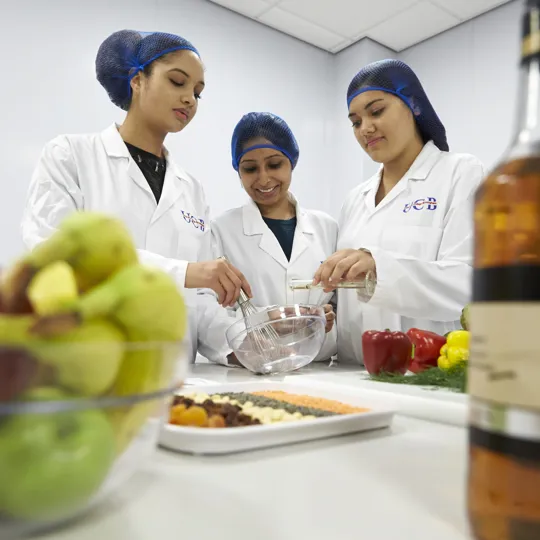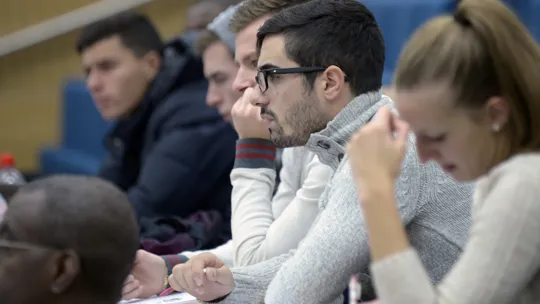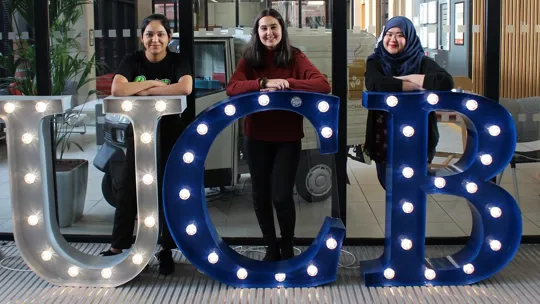Statement of General Policy
Our policy is to take all reasonable and practicable steps to provide and maintain safe and healthy working conditions, equipment and systems of work for all students, staff, contractors and members of the general public using or visiting University College Birmingham’s facilities.
Mobile Phones – Safety on stairs
University College Birmingham takes your safety seriously and aims to ensure that all significant risks are controlled to prevent accidents from occurring. You also have a responsibility to act in a safe manner.
Research has shown that a significant number of slips and falls are caused by people being distracted and not concentrating fully on what they are doing. It has also been found that whilst using your mobile phone you are not able to absorb enough information to judge steps or slopes correctly and therefore you are much more likely to fall.
Please refrain from using your mobile phone on staircases at all times. Staff will challenge any students found to be doing so and persistent offenders may be dealt with under the disciplinary process if appropriate.

Health, Hygiene and Safety Regulations
The regulations summarised briefly here comply with the Food Safety (England) Regulations 2006. For the protection of yourself and others, all students must observe the following regulations:
Students working in food production and hair and beauty areas
Students should remove all exposed jewellery before entering any food production or hair and beauty environment within the University. Jewellery includes:
- Earrings, studs and all visible body piercing (eyebrows, nose, tongue, lips, cheeks etc.)
- Bangles
- Rings – with the exception of plain gold wedding rings
- Watches
Students are advised that they should not have any exposed body piercing undertaken unless it can be physically removed before entering a practical environment. Applying a sticking plaster over exposed body piercing jewellery is not allowed in a practical environment. Disciplinary action will be taken against any student who does not comply with this regulation at all times.
Particular requirements relating to the handling of food
A person engaged in the handling of food shall take all steps as may be necessary to protect the food from any risk of contamination. Students should present themselves dressed in the appropriate clean protective clothing listed below before entering a food production area within the University:
- White chef’s jacket
- Chef's white neckerchief
- White aprons within kitchen areas
- Blue aprons within larder areas
- Small blue or black checked trousers
- White Chef's skull cap
- Non-slip safety shoes
- Oven cloth
It is against food safety regulations and the University regulations to wear any food production uniforms – for example, chef’s whites and food service uniforms – outside the University College Birmingham buildings.
Particular requirements relating to Hairdressing and Beauty Therapy
A person engaged in the practice and delivery of hairdressing or beauty therapy services should be dressed in the appropriate uniform and shoes designated by University College Birmingham before entering hair and beauty studios. Hair should be off the face, nails should not protrude beyond the end of the fingers, and all nail varnish should be removed. All jewellery is to be removed as stipulated in the above Health, Hygiene and Safety Regulations statement.
Persons suffering from certain infections
As soon as a person engaged in the handling of food becomes aware that he/she is suffering from, or is the carrier of, typhoid, paratyphoid or any other salmonella infection, or amoebic or bacillary dysentery, or any staphylococcal infection likely to cause food poisoning, he/she should inform the person in charge of the food business and that person shall immediately notify the appropriate medical officer of health accordingly. Therefore, students suffering from diarrhoea and/or vomiting, fever, abdominal pain, nausea or headache or who have any septic infection or cut should notify University College Birmingham immediately, should not attend any practical lecture, and should see the University Nurse or a First Aider immediately so that the appropriate action may be taken.
Dangerous machinery
Some machinery used regularly in kitchens and salons needs particularly careful handling, for example: mixing machines, dough mixers, vegetable cutters, epilation instruments, electrical massage treatments, etc. Anyone at University College Birmingham must, by law, be trained before they use such equipment and students under the age of 18 are not allowed to do the hazardous job of cleaning such items of equipment.
Follow these guidelines at all times:
- Do not use equipment unless full training has been given and is fully understood.
- If in doubt – ASK.
- Read the instructions before using the machine.
- Where safety guards are provided, these should always be used.
- Beware of sharp blades. These can be dangerous even when they are not moving.
- Hair should always be covered and kept away from machinery.
- Clothing should be kept out of reach.
- Do not use equipment that you suspect is faulty. Report it immediately and do not attempt to operate it until approval has been given to do so.
In the event of a fire
If you hear the fire alarm
Corridors and evacuation routes have Fire Action notices displayed informing you of what to do in the event of a fire and help identify the location of your emergency assembly point. You must leave the building as quietly and calmly as possible as soon as the fire alarm sounds.
DO NOT use mobile phones during evacuation of the building as this can cause accidents. You should proceed quickly to the assembly point for your class and wait until you are authorised to re-enter the building. Even if the fire alarm stops ringing on your way out of the building, you must continue to evacuate the building. You must not turn back.
If you discover a fire
- Sound the nearest fire alarm using the red fire alarm call point.
- If it is not possible to sound the alarm, report the fire to a member of staff.
- Do not attempt to extinguish the fire.
- If it is safe to do so, as you leave, turn off any gas and electrical appliances and close all doors and windows.
- Leave the building by the nearest but safest fire exit route (fire escape routes are signed).
- Do NOT use mobile phones while evacuating the building.
- Go to your designated assembly point.
- Do NOT stop to collect personal belongings.
- Do NOT re-enter the building until official authorisation to do so has been given.
- Do NOT use the lifts.
- ‘Safe refuge points’ for students requiring assistance to evacuate the building are clearly signed. A PEEP's plan (Personal Emergency Evacuation Plan) will be put in place as requirements are identified.
Assembly points
Summer Row
All students: Great Charles Street
The Link
Alongside McIntyre House on Holland Street.
McIntyre House
Alongside McIntyre House on Holland Street.
Moss House
Nursing and Exhibition Space - George Street alongside Camden House
All other students - Alongside McIntyre House on Holland Street
Camden House
Alongside McIntyre House on Holland Street
James Cond
Alongside McIntyre House on Holland Street
Baskerville House
Point 3, as designated alongside the canal - follow directions on fire action notices
Smoking Policy
In order to create a cleaner and healthier environment which can be enjoyed by everybody, University College Birmingham operates a non-smoking policy and smoking is not allowed anywhere on University College Birmingham premises. This includes electronic cigarettes.
In taking positive action to encourage a healthier, cleaner environment, University College Birmingham recognises that on occasion it may be necessary to take disciplinary action against students who contravene University College Birmingham approved smoking policy.
In addition, University College Birmingham will take steps to provide information for smokers who wish to stop smoking or adjust to this policy. This is achieved by displaying literature in prominent places and, when necessary, by counselling individuals.
Discover more

Equal Opportunities Policy
The aim of the Policy is to ensure that all students, employees, applicants and all those involved in its work, and other users of University College Birmingham fac…
Read more
Computer Misuse Policy
All access of computers and connected systems is governed by the Computer Misuse Act 1990. This act has created three criminal offences covering the usage of computers.
Read more
Higher Education Student Handbook
University College Birmingham HE Student Handbook deals with everything you will need to organise prior to your arrival here as a First Year student.
Read more
Open days
Come and visit us on one of our open days, where you can find out more about our courses, our facilities and speak to current students and staff.
Read more
Contact us
There are many ways you can contact University College Birmingham, from phone and email to social media.
Read more
Information for new students
Before you start your course at University College Birmingham, check this list to make sure that you have done all of the things on it that apply to you.
Read more
Information for continuing students
Before coming back to University College Birmingham, you should make sure that you have done all of the following things that apply to you.
Read more
Getting your voice heard
We are sure you will have opinions about your experience while you are studying at University College Birmingham and we would like to hear them.
Read more